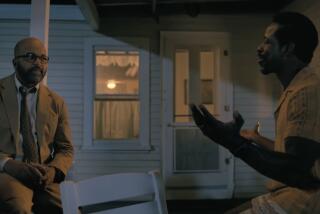‘A Dreadful Deceit’ argues against a ‘racial’ past
Four years ago, Atty. Gen. Eric Holder called us a “nation of cowards” for refusing to confront our racial past. Jacqueline Jones’ “A Dreadful Deceit” dismisses the very idea that our past is “racial.”
What Holder identifies as our national burden, Jones calls the “American creation story”: the narrative that slavery was born of racial prejudice and that the election of a black president marked a triumph over the long shadow of race. Her objective is to debunk the “myth of race,” to relieve Americans of the specious belief that “race is real and that race matters.”
Jones is not the first. Franz Boas, W.E.B. DuBois and Ashley Montagu are among a veritable sea of scholars who have shown that “race” has no scientific basis. It is a socially created means of classifying and ranking humans based on any number of criteria. It is about power, not biology.
Jones sets out to overturn the “creation story” with an alternative narrative fashioned from six fairly obscure lives: Symon Overzee, a plantation owner in 17th century Maryland tried for killing his slave; Boston King, a fugitive slave from South Carolina who preached and acted on behalf of his own liberty during the American Revolution; Elleanor Eldridge, a wealthy free black woman fighting discrimination in antebellum Rhode Island; Richard White, light-skinned, educated, Civil War veteran whose failed political career served as a microcosm for the triumph of racism and Reconstruction’s defeat; William Holtzclaw, who turned to education to fight Jim Crow and lynch law in Mississippi in the early 20th century; and Simon P. Owens, a black revolutionary auto worker navigating the shift from industrial to postindustrial Detroit in the late 1960s and ‘70s..
Each story provides a window into a time, a region and a web of political and legal entanglements. But as an argument about race, the book falls short. It asserts that slavery and discrimination were driven not by racial ideology but by the “raw power” of Europeans over a vulnerable people who, unlike Native Americans, had no strong nations to protect them. Slavery and the subjugation of free black people were therefore a matter of whites’ color-blind self-interest, whether it meant making money or protecting one’s job.
According to Jones, racial ideology didn’t truly rear its ugly head until the American Revolution. The myth of race was used by cynical elites to justify human freedom in a slave society and taken up by whites in the urban North confronted with (and threatened by) a free black population.
Much of the book’s argument rests on the opening story of Overzee’s murder trial. In Overzee’s effort to “correct” a defiant, kidnapped African named Antonio for running away, he severely whipped him, doused his back with scalding lard and then suspended him from a ladder by his wrists, where he ultimately suffocated to death. The court decided that this “ugly yelling Brute beast” got what he deserved and Overzee was acquitted.
Jones, a professor at the University of Texas at Austin and author of the Bancroft prize-winning “Labor of Love, Labor of Sorrow,” insists that “race” had nothing to do with these unfortunate events. That Overzee stood trial, she suggests, proves that the system was not governed by race. Of course, in a truly color-blind legal system, Antonio’s claims to having been kidnapped and held against his will — forced to labor without a contract, no less — would prevail. But in Jones’ view, Antonio was denied legal protections not because he was African but because he was not English, so English common law did not apply to him.
It is a tortured argument. By confining her purview to the provincial world of Overzee’s family and financial affairs in colonial Maryland and limiting “race” to a strictly biological definition, Jones excludes a great deal of context that contradicts or complicates her claims.
If “race” did not matter, why were anti-miscegenation laws introduced in the colonies in the mid-17th century? How do we account for the singularly brutal treatment of captured Africans on slave ships, where they were treated like wild animals, raped and portrayed as having “natural” proclivities for bondage and sexual intercourse?
English law did, in fact, cover Africans — as property. The transformation of Africans from coerced labor to actual chattel did not need biological justification to create a fundamental distinction between African bodies and the rest of humanity. Jones is right to point to the absence of “biological” arguments for African inferiority in the 17th century, but that is because Enlightenment ideas of human classification based on inherent biological difference did not appear until the mid- to late 18th century.
Once we widen our angle beyond the particularities of colonial Maryland, we begin to see not the absence of “race” but the evolution of racial slavery and the trans-Atlantic emergence of structural racism. Before the settling of Jamestown, processes akin to what we might call “race-making” were already in place in Europe — in anti-Semitism, in dehumanized depictions of the “Moors,” in the subjugation and representation of the Irish and the Slavs.
“A Dreadful Deceit’s” insistence that race is not a factor leads Jones to ignore racism’s role in creating economic inequality. Today’s workforce, she asserts, is “defined less by skin color and history than by shared powerlessness within a global economy.” But if truly “shared,” how do we explain the widening wealth gap between whites and blacks or that the world’s cheap apparel is made in the global South by a non-white, super-exploited labor force?
Jones generally treats “race” (a means of classifying difference) as a proxy for “racism” (a hierarchical system of subjugation based on race). The point is not that race explains everything but that racism is built into the very structure of the economy. Race may be a myth, but racism survives.
Where the book succeeds, ironically, is in its depiction of a powerful, democratic, black antiracist vision for America. Holtzclaw and Owens were activists who fought racism in their own way and worked tirelessly to create a different future founded on an authentic, nonracial democracy.
In a dazzling chapter, Jones explains how Owens and his comrades, in confronting automation, discriminatory unions and black urban rebellion in Detroit, audaciously tried to convince white workers that antiracism was in their interest.
Owens knew that the society he envisioned — an alternative to our corporate-run world of low wages, “Stand Your Ground” laws, police brutality and vast inequality — was impossible as long as racism prevailed.
Kelley is a professor of American history at UCLA and author of “Africa Speaks, America Answers.”
A Dreadful Deceit
The Myth of Race From the Colonial Era to Obama’s America
Jacqueline Jones
Basic Books: 400 pp., $29.99
More to Read
Sign up for our Book Club newsletter
Get the latest news, events and more from the Los Angeles Times Book Club, and help us get L.A. reading and talking.
You may occasionally receive promotional content from the Los Angeles Times.






